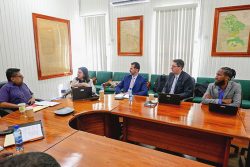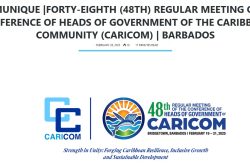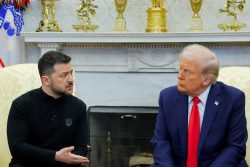Guyana is committed to achieving universal secondary education, Minister of Education Priya Manickchand told the 37th General Conference of UNESCO in Paris, France last week.
Highlighting the government’s commitment to providing universal access to quality education throughout Guyana, Manickchand said in her address, “Guyana, like many developing countries has recognised that to be competitive in a globalised economic environment, more of its citizens need to move beyond primary education. The government has therefore set the attainment of universal secondary education as a major objective in its current Education Strategic Plan and continues to work assiduously on the outstanding goals that still need to be realised.”
The minister lauded UNESCO for its multifaceted approach to contributing to development in the areas of education, science and culture.
Manickchand said the President of Guyana had been pleased to accept an invitation from the UN Secretary General in 2012 to be part of the Global Education First Initiative; and as a Champion Country, Guyana was committed to the promotion of universal access to quality education and to the sharing of experiences and best practices.
She said, “Guyana was one of the first countries to benefit from the Education for All Fast Track Initiative (EFA-FTI). This assistance was used to reduce the disparities which exist between the more accessible coastal regions and remote hinterland locations where the majority of the indigenous population resides. As a result, much progress has been made in areas where there were differences in the quality of teachers and the availability of support materials and equipment. The Government of Guyana has continued all of the initiatives under this programme while at the same time continuing its national programme of welfare initiatives, such as free text books and free school uniforms, as well as a national snack programme.”
Updating the conference on progress achieved towards the ‘Education For All’ goals, the minister said that while Guyana has already achieved Millennium Development Goal 2, which is universal primary education, it continues to work to maintain this achievement and also that of gender parity at primary and secondary levels.
She said Guyana was particularly proud of the strides that have been made in improving early childhood care and development through a multi-sectoral approach that has involved the ministries of Health, Human Services and Social Security, and Education. She also revealed that, “Although pre-primary education is not compulsory, more than 80% of the relevant age cohort is in pre-primary (nursery) schools.”
The minister thanked UNESCO for its continued support of national
education programmes in Guyana. She pointed out that UNESCO has provided much valuable assistance under its Global Micro Science programme providing kits and manuals and the training of teachers. “The impact of this programme,” she said, “has been greater in hinterland schools where there are no science laboratory facilities and has resulted, generally, in a 20% increase in student enrolment in science subjects over the last three years.” She was optimistic about all schools eventually having access to those micro-science kits.
Another area in which UNESCO was playing an active role was in Technical and Vocational Education and Training (TVET). “Our TVET programme has also been supported by UNESCO through the development of a Documentation and Materials Production Centre at the Secretariat of the National Council for TVET, the establishment of resource centres at four TVET institutions and the training of thirty lecturers/instructors to conduct assessments of students who are pursuing studies in competency-based modularized programmes,” the minister said.
“UNESCO has also assisted in the preparation of A Science and Technology Master Plan for the socio-economic and environmental advancement of Guyana, which will assist in improving science education in Guyana. We take this opportunity to thank UNESCO for the assistance provided in these areas,” the minister stated.
However, she also admitted that while Guyana has much to be proud of, there were still many challenges remaining. “In spite of an increasing proportion of trained teachers and all the initiatives already cited, poor learning outcomes in key subject areas such as Mathematics and English are of great concern. ‘Meeting the Quality Imperative’ has now become the overwhelming goal. It is evident from the work of the Learning Metrics Task Force convened by UNESCO through its Institute for Statistics and the Centre for Universal Education at the Brookings Institution that this (learning) is now an issue of international concern. Guyana supports the work of this Task Force and looks forward to the continued sharing of information and collaboration in the implementation of the recommendations,” she said.
The minister asserted that as Guyana and UNESCO continue to enjoy a mutually beneficial relationship, it is hoped that greater collaboration will yield enduring sustainable growth in the education sector.
Apart from education, she said, government and UNESCO will be working together on the application process to designate Guyana’s majestic Kaieteur Falls as a UNESCO Heritage Site.
The UNESCO General Conference, which started on November 5, ends on November 20. Marion Herbert, Consular Officer at the Guyana High Commission in London is attending and will represent Guyana for the remainder of the conference.









